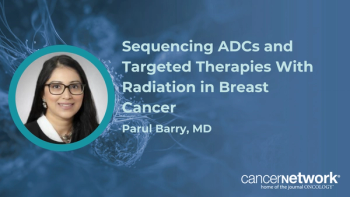
Oncology NEWS International
- Oncology NEWS International Vol 19 No 8
- Volume 19
- Issue 8
Cell-signaling pathway may be new Rx target ER+ breast cancer
Cancer investigators at Vanderbilt-Ingram Cancer Center in Nashville, Tenn., have confirmed that the PI3-kinase (PI3K) pathway offers a promising therapeutic target in patients who develop resistance to standard endrocine therapies.
Cancer investigators at Vanderbilt-Ingram Cancer Center in Nashville, Tenn., have confirmed that the PI3-kinase (PI3K) pathway offers a promising therapeutic target in patients who develop resistance to standard endrocine therapies.
Todd W. Miller, PhD, Carlos L. Arteaga, MD, and colleagues developed and studied long-term estrogen-deprived derivatives from a panel of 4 ER-positive hormone-dependent breast cancer cell lines. These cell lines provide models of resistance to aromatase inhibitors. They treated all four cell lines with BEZ235m, an investigational drug that blocks PI3K/mTOR. They found that BEZ235m slowed or stopped growth in all of the cell lines and triggered cell death in three of the four cell lines (J Clin Invest 120:2406-2413, 2010).
"We found that those cells exhibited increased activity in the PI3K/mTOR signaling pathway and that PI3K signaling was required for the cells to become hormone-independent," Dr. Miller said. "We were able to identify a protein signature of PI3K pathway activation in tumor biopsies that predicts poor disease outcome for women who have been on long-term endocrine therapy."
The group also found that three of the four models retained the ability to grow even with low levels of estrogen, suggesting that ending the use of aromatase inhibitors in patients whose cancer progresses on this therapy may not always be wise. Eliminating the aromatase inhibitor may simply cause the body to resume estrogen production, stimulating the cancer.
"Our findings suggest that patients with hormone receptor-positive tumors exhibiting a high degree of PI3K signaling, and who relapse on endocrine therapy, may benefit from treatments targeting both the ER and the PI3K pathways," Dr. Miller explained.
Dr. Arteaga is a professor of medicine and cancer biology and leader of the center's breast cancer program. Dr. Miller is a research assistant professor of cancer biology. The research was supported by grants from the NIH, the Breast Cancer Research Foundation, the Kleberg Center for Molecular Markers, ASCO, and Stand Up To Cancer.
Articles in this issue
over 15 years ago
Who's Newsover 15 years ago
Sonography better to monitor small testicular lesionsover 15 years ago
FDA Panel Says No More Avastin in Breast Cancerover 15 years ago
Ohio cancer center breaks ground on $1 billion additionover 15 years ago
Imaging experts debate link between CT scans, cancer riskNewsletter
Stay up to date on recent advances in the multidisciplinary approach to cancer.





































